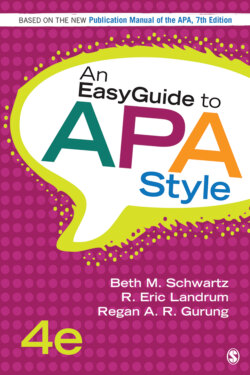Читать книгу An EasyGuide to APA Style - Regan A. R. Gurung - Страница 14
На сайте Литреса книга снята с продажи.
Write for Your Specific Audience: Term Papers Versus Formal Research Papers
ОглавлениеUltimately, we all have to play by the rules. Unfortunately, the rules are often a moving target. Have you heard the variation on the Golden Rule—those who have the gold make the rules? In this case, your audience makes the rules for your writing, and your audience (your instructor) may not always be clear about expectations, which means you have to be. Although there are many excellent, skilled, caring instructors out there (we know many of them and salute them all), not all pay as much attention to the assignment design as they could. For example, an instructor may give a writing assignment, like the one in the box below, thinking the instructions are perfectly clear. But see how many questions we have after reading the “assignment.”
Before class next week, I want you to pick a topic in psychology and write a research paper about your topic. Be sure to use evidence to support your position. Make sure you complete the following:
1 Write in APA format.
2 Your paper must be 5 to 7 pages in length.
3 To save paper, use single spacing.
4 Use reference citations in the text of your paper to support any claims you make.
The paper is due on Thursday, and here it is Wednesday night (though we do not recommend waiting until the night before); you sit down to write your paper—no problem? Take a closer look at this assignment; it is wide open and does not provide enough detail for you to be confident about what your audience (your instructor) wants. The instruction “write in APA format” is vague at best, especially because it is contradicted by the third point in the assignment; APA format uses double-spacing in the text. Does this instructor want a title page? An abstract (probably not)? A references page? Do the title page and the references page “count” toward the five- to seven-page requirement? Are direct quotations OK? Are a minimum number of references required? Can you use all kinds of reference materials or just refereed journal articles?
First, an important point: We hope you know that it pays to start the writing process earlier. Not only would you have more time to get clarification on the assignment; you would have time to write more than one draft, something that contributes to higher-quality papers (Landrum, 2012). Additionally, Gurung (2009) showed that students who start assignments earlier do better in class.
A basic tenet of any type of writing is this: Write for your audience. In most cases now, your audience is your instructor. You need to know what your instructor wants, even if the instructor thinks the instructions are clear. You need to know the questions to ask so you can get the answers you need to succeed. This book will help you identify which questions to ask, and when you get the answers, we will give you specific tips on how to do well on the major parts of your writing assignments, whether they are term papers or research papers.
So what would a research paper look like? A research paper, especially in psychology (as in an experimental paper), is typically scripted; you are likely to have specific subsections, such as a Method section and a Results section, and many other details to attend to. A research paper is likely to employ APA Style and most, if not all, components of APA format. Even though APA Style and format provide particulars about how to write your paper, what you will discover is that different instructors have different expectations about style and format; attention to detail will be of ultimate importance to some, and others may not care at all. You cannot use a one-size-fits-all approach and expect to be consistently successful in your coursework. You may need to change your writing approach to fit both the assignment and the instructor; in fact, your instructor’s expectations during a semester may change as well. (We know—that can be frustrating.) Do not be shy. Ask questions. If you are brave, point out inconsistencies, pay attention to details, and work to meet the needs of your audience. If you can conquer these lessons as an undergraduate student, these skills and abilities will serve you well beyond graduation.
